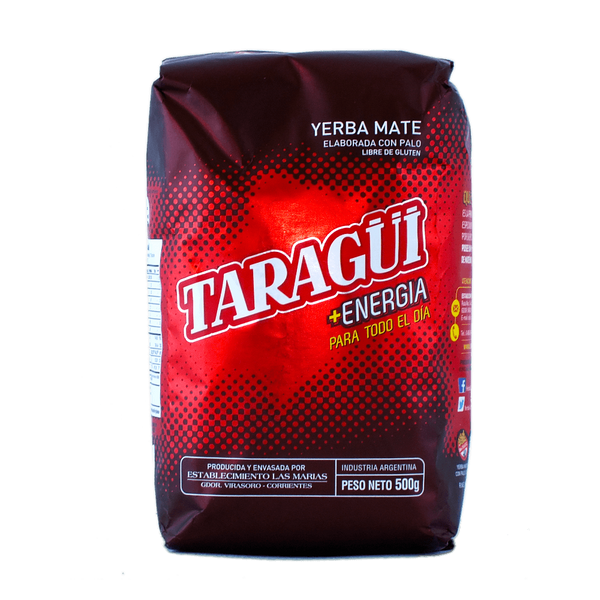Rooibos. Is it tea or not?

Coffee and tea are the most popular stimulating infusions around the world. To our hearts, in love with South America, yerba mate is the closest. The warm brew pleasantly warms, stimulates and relaxes at the same time. However, not everyone likes the caffeine contained in tea or mate. The solution is rooibos, which is gaining in popularity. What is it, what does it taste like and are there any contraindications to drinking it?
Summary:
- Rooibos – the red African herb
- Rooibos healthier than green tea? What do you find in it?
- Rooibos tea – how does it work? Health benefits
- Rooibos for weight loss and more...
- Does rooibos tea exhibit medicinal properties?
- Rooibos – is it tea or not?
- How to brew rooibos tea?
- Are there any contraindications for drinking rooibos tea?
- Keep calm and drink rooibos. Cheers!
Rooibos – the red African herb
You have no doubt heard the name. "Rooibos" is a combination of two words from Afrikaans and literally means "red bush". The botanical, Latin name of the plant is Aspalathus linearis. Rooibos grows in the southern part of Africa, more specifically in the Cederberg mountains. It is an undersized shrub, reaching a maximum height of 2 metres. It has soft needle-shaped leaves and blooms with yellow flowers. In Africa, rooibos is said to have been known thousands of years ago, but it came to Europe relatively recently, in the early 20th century. This was thanks to a Russian merchant, Benjamin Ginsberg, who travelled to Africa and became interested in the shrub grown by the natives. He conducted a series of experiments on the plant to improve production and develop the industry. About 30 years later, the properties of rooibos were studied and described by French physician Dr Pieter Le Fras Nortier.
Rooibos healthier than green tea? What do you find in it?
There are about 30 phenolic compounds in rooibos, which are widely appreciated for their antioxidant properties. Among these, aspalathin is considered the most important. The concentration of polyphenols in rooibos is up to ten times higher than in green tea! Antioxidants combat the formation of free radicals in the body, which contribute to faster cell ageing, alter DNA structure and increase the risk of cancer.
The chemical composition of rooibos tea also includes compounds such as:
- tanin
- rutin
- luteolin
- flavonols
- quercetin
- tannins and coumarin in small amounts
A cup of rooibos tea also contains minerals:
- fluorine
- calcium
- iron
- potassium
- magnesium
- copper
- manganese
- sodium
- phosphorus
- zinc
- vitamin C
Speaking of what is in rooibos, it is also important to mention what is not in it. Rooibos does not contain caffeine, which distinguishes it from regular tea or yerba mate.
Rooibos tea – how does it work? Health benefits
It does not contain caffeine, so it does not stimulate like coffee or, to a much lesser extent, tea. So why drink redbush tea? Is rooibos healthy? Absolutely! We have mentioned the huge amount of polyphenols contained in rooibos, so it has a strong antioxidant effect. The vitamins and minerals it contains make it excellent for nourishing the body. The combination of antioxidants with micronutrients also makes rooibos excellent for immunity – helping to avoid the common cold. The quercetin found in it is a common ingredient in anti-allergic remedies. An infusion of rooibos therefore relieves mild allergy symptoms. Fluorine, in turn, has a beneficial effect on tooth enamel. The cinnamic acid contained in rooibos has an antibacterial and fungicidal effect, which translates, among other things, into a more efficient digestive system. Some people wonder whether rooibos tea acidifies the body? No, it has exactly the opposite effect. It deacidifies the body and helps to get rid of unpleasant discomforts such as abdominal pain, constipation or an upset stomach. Rooibos tea also has an excellent effect on the liver, showing regenerative effects. In addition, it has a calming effect. It relaxes and soothes irritability, and has a similar effect to lemon balm infusion in this respect.
Rooibos for weight loss and more...
In addition to the properties mentioned above, the red bush infusion also has an effect that may strongly encourage some to drink it. It turns out that rooibos tea works well for weight loss. The infusion of the African herb is low in calories and supports the metabolic process well. Many people wonder if rooibos tea is diuretic? In coffee, yerba mate or regular tea, caffeine is responsible for this effect, which is not present in rooibos. Rooibos has a different effect. It hydrates the body very well and, therefore, regular drinking encourages more frequent visits to the toilet. This removes toxins and various harmful substances that build up in the body more efficiently. Rooibos has a salutary effect not only on the inside, but also on the outside of the body. The previously mentioned antioxidants inhibit cellular ageing, which also affects the skin. The infusion can be drunk, but also used as a natural tonic. Rooibos soothes inflammation and irritation. It promotes wound healing, soothes sunburn and aids in the treatment of acne. Red bush compresses will help get rid of unsightly bags under the eyes. What's more, the beneficial effects of rooibos on wrinkle reduction have been exploited by cosmetics manufacturers, who add red bush extract to creams. It also has a good effect on hair – accelerating its growth and preventing hair loss. It is therefore added to shampoos and conditioners.

Does rooibos tea exhibit medicinal properties?
African rooibos tea is not a medicine, but due to its health benefits, it can be an excellent support in the treatment of certain diseases, as confirmed by scientific studies. Over the years, a number of tests have been carried out – both on animals and humans – investigating the effect of rooibos on blood glucose levels. Polyphenols play an important role in this. The aspalathin contained in rooibos was found to have anti-diabetic properties. The redbush infusion not only reduces insulin resistance, but alleviates diabetes-related complications. Studies have also shown that the active ingredients in rooibos have an impact on metabolic syndrome, which consists of disorders such as obesity, hypertension and disorders of carbohydrate and lipid metabolism. During the study, a group of people at risk of cardiovascular disease were given six cups of the brew for six weeks. After this time, there was an increase in antioxidant enzymes, a reduction in “bad” cholesterol and triglycerides and an increase in “good” cholesterol. Due to its high iron content, rooibos tea is recommended during pregnancy and for people suffering from anaemia.
Rooibos – is it tea or not?
We already know that rooibos is healthy, but let's get back to what it actually is. Commonly, rooibos is referred to as red tea, and although we ourselves have used the term “rooibos tea” several times in this text, we admit that this is not quite the correct name. "Red" in the name refers to the copper colour of the dried leaves and the infusion made from them, and with this part we completely agree. However, the term "tea" used in colloquial speech raises doubts, although it is somewhat understandable. The word “tea” refers to infusions made from the leaves of the tea plant (Latin: Camellia sinensis). Although many types of tea are known – black, green, white, yellow and their most diverse varieties – they are all made from the same plant. By definition, therefore, rooibos is not a tea. There are, however, some similarities. Firstly, before the dried plant is put into the teapot to make an infusion, it goes through a production process that is very similar to that used for tea. After being harvested, the red bush leaves and stems undergo fermentation, during which they acquire their characteristic red colour. Sometimes the fermentation is omitted. When subjected only to a drying process, the leaves retain their olive-green colour – this is how the green variety of rooibos is made. Secondly, rooibos is often confused with tea because of the way the infusion is prepared.
How to brew rooibos tea?
An infusion of rooibos is prepared in virtually the same way as tea. Simply pour 1-2 teaspoons of dried rooibos into a cup, pour in boiling water and let steep for about 4-5 minutes. Due to the rather fine texture of the dried leaves, you can use a brewer. The dried herb is copper-red in colour and the infusion made from it is the same colour. It has a pleasant, herbal, fruity and earthy aroma. The taste is mild and sweet, with a noticeable honey note. It does not have the bitterness typical of tea or yerba mate. It works well not only in the warm version, but also as a cold brew drink. When served cool, it is an excellent thirst quencher.
Are there any contraindications for drinking rooibos tea?
We have no doubt that African redbush tea is healthy, but can everyone drink it? Are there any contraindications to drinking rooibos tea? And how does it compare in the context of breastfeeding? Unlike coffee or regular tea, rooibos tea does not contain caffeine, so it is completely safe for both babies and pregnant women. Caffeine stimulates and causes irritability, and can also contribute to insomnia. Rooibos tea, which does not contain it, is also safe for children. Does rooibos tea raise blood pressure? No, regular drinking of the brew not only lowers but also regulates blood pressure. Rooibos exhibits many health-promoting properties and is undoubtedly worth introducing into your diet, but we must mention at this point that cases of an adverse reaction of redbush tea with some medicines have been reported. People who are under the constant care of a doctor due to chronic illnesses should therefore first consult a specialist before deciding to drink rooibos regularly.
Keep calm and drink rooibos. Cheers!
If we have encouraged you with the wonderful properties of the African “tea”, you are probably wondering where to buy it and which one to choose. In our shop, you can buy high-quality classic Rooibos Superior from the popular tea brand Mary Rose – without any additives and at a very affordable price. Due to its mild taste and aroma, the red bush not only tastes great solo, but also combines perfectly with additives, tea or yerba mate. For fans of stimulating infusions, we recommend a surprisingly tasty composition of Brazilian yerba mate, rooibos and cherries – Yaguar Cherry Lady. For those who prefer milder infusions, however, we recommend the Yerbatea from Mary Rose – Rooibos Pear. It is a combination of yerba mate and tea (in this case rooibos), with the addition of juicy pear and apple.
Source of information:
- Wikipedia: Rooibos.
- E. Joubert, Rooibos (Aspalathus linearis) beyond the farm gate: From herbal tea to potential phytopharmaceutical, South African Journal of Botany, 2011.
- M. Sasaki, N. Nishida, M. Shimada, A Beneficial Role of Rooibos in Diabetes Mellitus: A Systematic Review and Meta-Analysis, Molecules, 2018.
- K. Bernacka, Herbata z czerwonokrzewu. Rooibos w terapii zespołu metabolicznego, 2020.
- N. Plewa, Rooibos – „herbata” dla wszystkich?, 2019.




